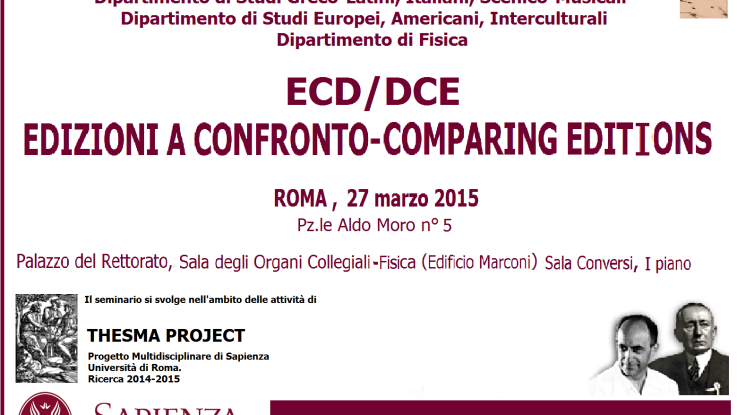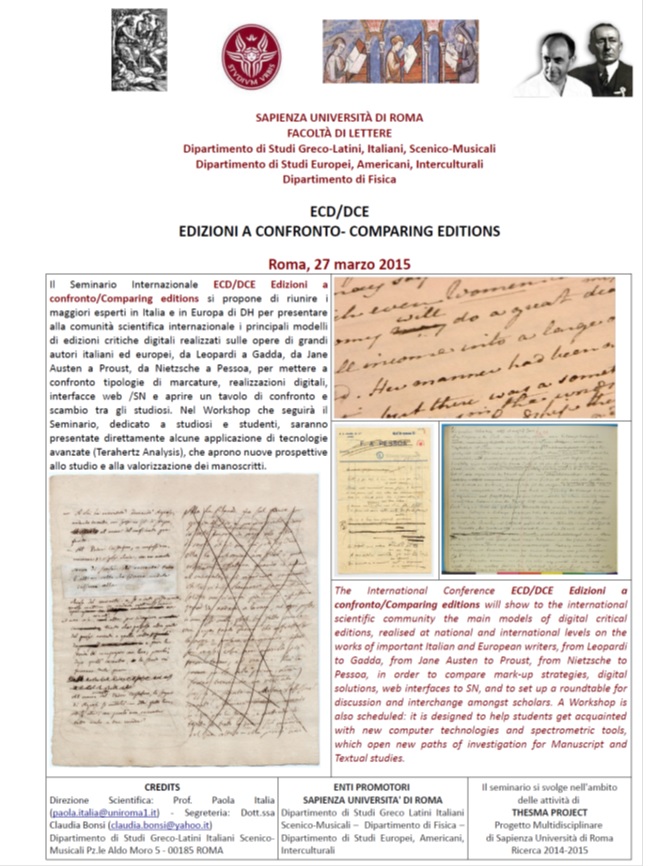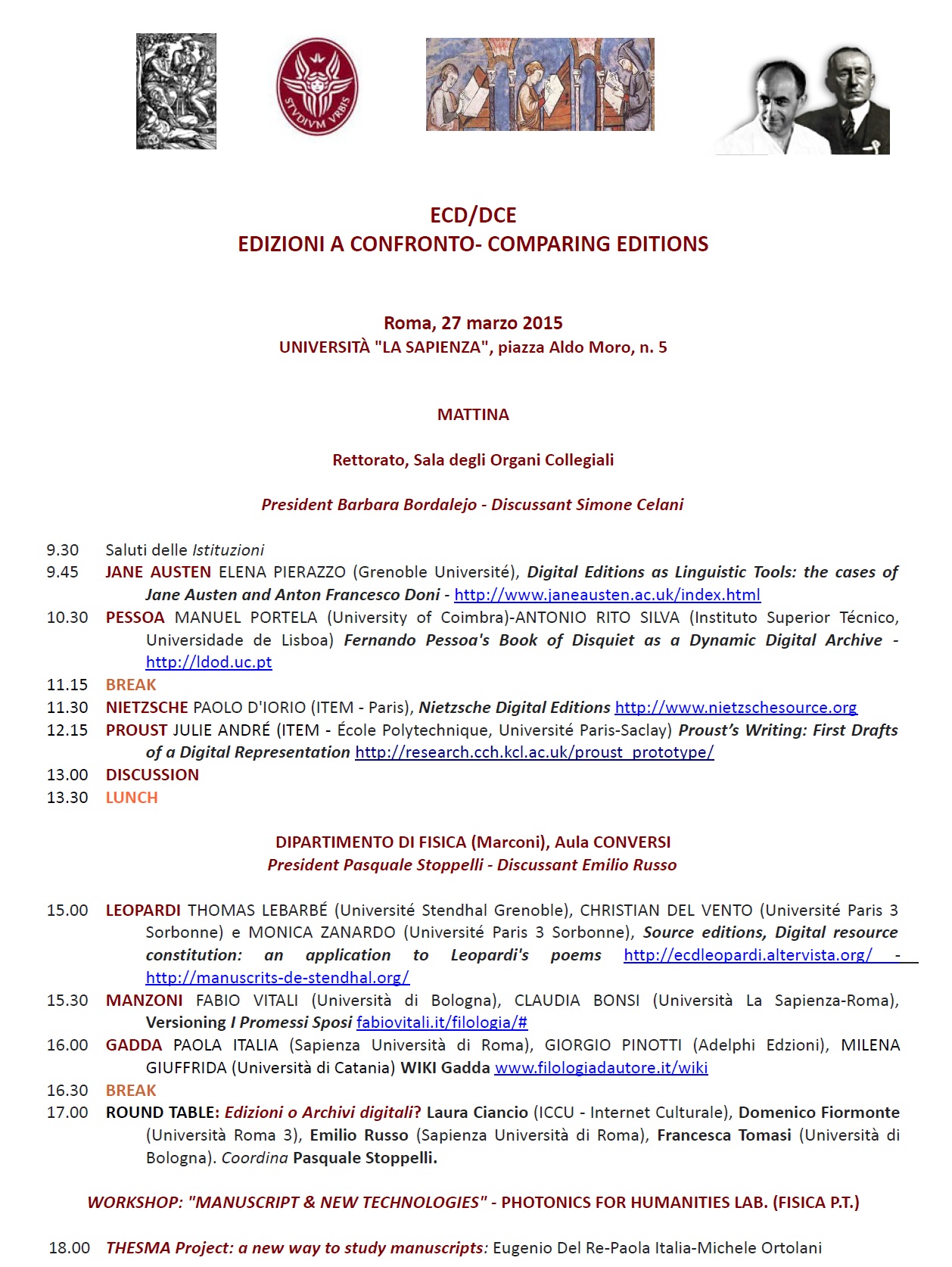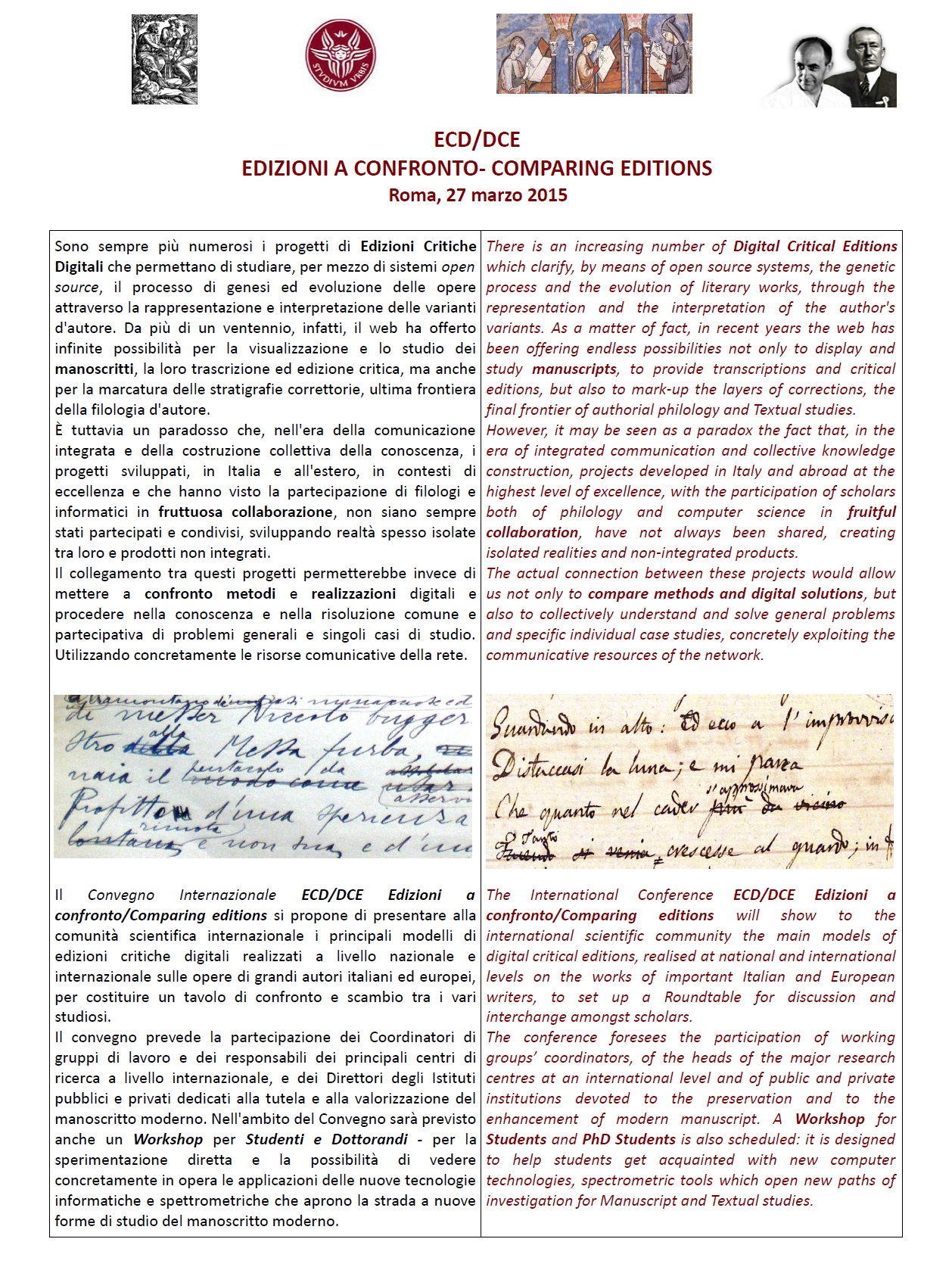
Venerdì 27 marzo 2015 si è svolto il seminario di studio dal titolo ECD/DCE Edizioni a confronto-Comparing editions. Il seminario, promosso dal Dipartimento di Studi Greco-Latini, Italiani, Scenico-Musicali, dal Dipartimento di Studi Europei, Americani e Interculturali e dalDipartimento di Fisica dell’Università degli studi di Roma La Sapienza, avrà luogo presso il Palazzo del Rettorato, Sala degli Organi Collegiali (9.30-14) e presso la Sala Conversi (dalle 15).
ECD/DCE
EDIZIONI A CONFRONTO- COMPARING EDITIONS
Roma, 27 marzo 2015
ABSTRACTS
JANE AUSTEN ELENA PIERAZZO (Grenoble Université), Digital Editions as Linguistic Tools: the cases of Jane Austen and Anton Francesco Doni – http://www.janeausten.ac.uk/index.html
The paper will focus on the methodological aspects connected to the preparation and dissemination of two scholarly editions: the Jane Austen’s Fiction Manuscripts and the edition of the Renaissance’s play Lo Stufaiuolo by Anton Francesco Doni. In particular the talk will concentrate on digital-driven changes on the heuristics of textual scholarship; the change in the perception of scholarly work, and the elaboration of new editorial models, analysing the theoretical implication of a new editorial model based on the provision of overabundant, paradigmatic information. In fact, these editions challenge the rigid separation between edition of sources and critical editions, as well as challenging editors to reinvent themselves as encoders, data managers and cultural facilitators.
Elena Pierazzo is Professor of Italian Studies and Digital Humanities at the University of Grenoble 3 ‘Stendhal’; formerly she was Lecturer at the Department of Digital Humanities at King’s College London where she was the coordinator of the MA in Digital Humanities. She has a PhD in Italian Philology: her specialism is Italian Renaissance texts, digital edition of Early Modern and modern draft manuscripts, and text encoding. She is the Chair and C.E.O of the Text Encoding Initiative and involved in the TEI user-community, with a special interest in the transcription of modern and medieval manuscripts. She co-chairs the working group on digital editions of the European Network NeDiMAH.
PESSOA MANUEL PORTELA (University of Coimbra)-ANTONIO RITO SILVA (Instituto Superior Técnico, Universidade de Lisboa) Fernando Pessoa’s Book of Disquiet as a Dynamic Digital Archive – http://ldod.uc.pt
LdoD Archive is a dynamic digital archive based on Fernando Pessoa’s Livro do Desassossego [“L. do D.”]. The Archive contains facsimiles and textual transcriptions of autograph witnesses (manuscripts, typescripts, printed texts) as well as textual transcriptions of four editions of the Book of Disquiet published between 1982 and 2010. All variations across the textual corpus have been marked up in TEI-conformant XML. This granular encoding has enabled us to automate comparisons between any 2, 3, 4 or 5 versions of any given fragment, both at the micro-scale of textual form, and at the macro-scale of bibliographic structure. Besides the set of functionalities related to the scholarly level of the archive, the LdoD Archive provides a set of software tools that allow readers to generate further content by creating their own editions and annotations within the archive’s virtual layer. The research for this project culminated in a dynamic model for a digital archive, which brings collaborative computing techniques into the universe of critical editing and reading in digital media. This paper discusses the conceptual and technical virtualization of the Book of Disquiet as a digital simulation of the dynamic nature of textual fields. The procedural and participatory affordances of the Archive will be illustrated throughout with the current version of the LdoD Archive.
Manuel Portela is assistant professor with Habilitation in the Department of Languages, Literatures and Cultures, University of Coimbra, Portugal, where he directs the Doctoral Program in Advanced Studies in the Materialities of Literature. He is also a researcher at the Centre for Portuguese Literature at the University of Coimbra, and the principal investigator of the project No Problem Has a Solution: A Digital Archive of the Book of Disquiet (2012–15). His latest book is Scripting Reading Motions: The Codex and the Computer as Self-Reflexive Machines (MIT Press, 2013).
António Rito Silva is associate professor in the Department of Computer Science and Engineering, University of Lisbon, and researcher at the INESC-ID. He has worked in the field of collaborative systems and social software, particularly in the domain of business processes tools that blend the roles of producer and consumer. In this project he intends to apply some of these techniques for connecting the roles of producer and reader of the literary work.
NIETZSCHE PAOLO D’IORIO (ITEM – Paris), Nietzsche Digital Editions http://www.nietzschesource.org
This paper presents the general aim of the Nietzsche Source website and its relationship with the original HyperNietzsche project. It includes a description of two scholarly editions of Nietzsche’s work: the fac-simile edition (Digitale Faksimile Gesamtausgabe, DFGA), which aims to publish for the first time a digital reproduction of the complete Nietzsche works, letters and manuscripts; and the reference critical edition (Digitale Kritische Gesamtausgabe Werke und Briefe, eKGWB), which publishes a revised and updated version of the text of the reference Colli / Montinari critical edition.
Paolo D’Iorio. Musician and Philosopher by training (Diploma at the Conservatorium for Music in Lucca, PhD at theScuola Normale Superiore in Pisa, Habilitation a Diriger des Recherches at the University of Nice), since 1998 Paolo D’Iorio is research professor at CNRS. From 2001 to 2006 he has been director of the HyperNietzsche project at the University of Munich as Sofja Kovaleswkaja prize-winner of the Humboldt Foundation. From 2007 to 2011 he has been visiting scholar in Oxford (Maison Francaise d’Oxford and at the Oxford Internet Institute). At the moment he is director of the Institut des Textes et Manuscrits Modernes (CNRS / ENS) in Paris where he is also responsible of theéquipes “Nietzsche” and “Humanités numériques”. His publication list comprises 80 publications in 16 books (monographs, text editions, collective works) and 62 articles and reviews, published in 6 languages. He organized 37 international conferences and seminars and given 120 conference presentation and public lectures in 12 countries, in English, French, German, Italian.
PROUST JULIE ANDRÉ (ITEM – École Polytechnique, Université Paris-Saclay) Proust’s Writing: First Drafts of a Digital Representation http://research.cch.kcl.ac.uk/proust_prototype/
The Proust prototype that we developed with Elena Pierazzo (Grenoble University) could be considered as a first step to a future digital edition of Proust’s manuscripts. The aim of our prototype is to emphasize the process of writing through an example, a few pages of one of Proust’s notebooks (Cahier 46). Indeed, this prototype can show Proust’s writing and its transcription at the same time. Further, it offers the readers several paths through the writing. The first path called “reading sequence” allows the users to visualize the way to read the last version of the story directly on the page. The second, the “writing sequence”, tries to rebuild and to show a hypothesis about the stages of writing on the draft in the chronological order. So the interest of this digital project is to focus on the dynamics of writing in drafts and to represent the making of the work.
Julie André is an assistant professor in French at the Ecole Polytechnique (University of Paris-Saclay) and a member of the ITEM (Institut des Textes et des Manuscrits Modernes) research group (which is part of the CNRS, Centre National de Recherche Scientifique). She holds a PhD in French literature from The Sorbonne (Paris 3). Her doctoral dissertation was on one of Proust’s notebooks, Cahier 46. Her current research is on literary genetics, more specifically on Proust’s manuscripts. She is in the process of completing an edition of one of Proust’s notebooks the Cahier 7 (in collaboration with Matthieu Vernet and Emanuele Arioli) to be published in 2015 (BNF/Brepols). She is also co-organizing an international conference titled Le français écrit au siècle du numérique: enseignement et apprentissage, to be held at the Ecole Polytechnique in October 2015.
LEOPARDI THOMAS LEBARBÉ (Université Stendhal Grenoble), CHRISTIAN DEL VENTO (Université Paris 3 Sorbonne) e MONICA ZANARDO (Université Paris 3 Sorbonne), Source editions, Digital resource constitution: an application to Leopardi’s poems http://ecdleopardi.altervista.org/ – http://manuscrits-de-stendhal.org/
The latest practices in the field of humanities, induced by the blossoming digital tools, define structured data as their nerve centre. Editing sources is no more a simple editorial task aimed at the creation of a paper object whose symbols and abbreviations are often so cryptic to be intelligible only by a few people. Nowadays, digital editing entails the description of a textual content both in its physical aspects (the manuscript’s page) and in its chronological development. The resulting structured data, relying on well-proven encoding tools (Unicode, XML, TEI), can be represented (in the original meaning of the term, that is, “presented anew”) in multiple forms answering multiple needs: the “traditional” editorial form (with an apparatus, and symbols, and so on) such as conceived by italian textual criticism (filologia d’autore), as well as dynamic graphic representations. However, the technologization of scientific processes makes it sometimes difficult for researchers in the humanities to handle such tools. The disciplinary bridge can only be crossed if the effort is shared – first, tools have to be adapted to the digital literacy of the knowledge holders, simultaneously an increased awareness and training of researchers to the inter-disciplinary dialogue and to digital modalities is required. We shall back-up our presentation with the reflexion we are leading, between France and Italy, between Computing, Literature and Linguistics, on digital editorialization and natural language processing of Leopardi’s poems sources.
Christian Del Vento, Doctor of Philosophy of the Scuola Normale Superiore (Pisa, Italy), has been teaching at the ENS of St-Cloud, Bordeaux 3 University, Paris Sorbonne University, Caen University. He became Full Professor at Grenoble University (2009), where he directed the EA 611 GERCI. Since 2012 he has been teaching in Sorbonne Nouvelle University, in Paris, where he directs the Dept. of Italian and Rumanian Studies and the CIRCE (EA 3979 LECEMO). He is member of the executive board and of the board of directors of Sorbonne Nouvelle University. He has carried out research on Italian literature and culture of the Enlightenment and 19th century, and especially on Foscolo and Alfieri; since 2013, he is Secretary-General of the French Society for Eighteenth Century Studies (SFEDS). Among his interests, Italian culture and intellectual life of the 20th century and history of libraries: he leads the BiPrAM project (winner of the 2011 CIBLE program), devoted to the study of the influence of literary and scientific tendencies towards the influence of personal collection of books. He is interested in writer’s libraries and in particular in the catalog and reconstruction of Vittorio Alfieri’s library in Paris. He is a member of various laboratories, among which the CNRS-ITEM (Institut des Textes et Manuscrits Modernes), where he he is responsible for a research team on Italian Enlightenment manuscripts.
Thomas Lebarbé is professor in Digital humanities at Grenoble – Alpes University. Coming from a heterogeneous background (communication engineer, IP rights management counsellor, Doctor of IT, HDR in science of language) he fosters the interchange of disciplines as a source of scientific innovation. He’s been leading his research work for the past ten years in what’s nowadays called textual digital humanities – constituting, exploiting and editing sources and digital texts corpora, and the underlying computational questions that are too often underestimated: digital literacy, standards, instrumentation and instrumentalization. The project manuscrits-de-stendhal.org, that he is coordination with Mrs Cécile Meynard, professor in XIXth century literature, is considered as a flagship project in digital humanities and the promotion of literary heritage. He teaches computing as a discipline integrated within the humanities, from natural language processing to digital humanities, claiming that computer usage should be a normal practice in the humanities. Designated project manager in DH for his university since 2013, he coordinates since 2015 the CAHIER consortium (Author corpora in the humanities: digitization, edition and research) for the CNRS research infrastructure HumaNum which mission is to promote and support emerging programs in digital humanities.
Monica Zanardo graduated at the University of Siena. In 2009 she started a PhD programme in Italian Literature (L’interpretazione – Letteratura italiana) at the University of Siena, obtained a Master certificate, and attended an official training course on digital textual criticism and editing (Edizione elettronica del testo e del documento). In 2014 she obtained a PhD in “Filologia, Linguistica e Letteratura” (Textual criticism, Linguistics and Literature), at the University of Rome La Sapienza, with a Thesis on “The manuscripts of La Storia by Elsa Morante”. She collaborates with the CNRS-ITEM (Institut des Textes et Manuscrits Modernes, Paris), with a research project on the digital edition of the manuscript Alfieri 13 (Towards Digital Alfieri).
MANZONI FABIO VITALI (Università di Bologna), CLAUDIA BONSI (Sapienza Università di Roma), Versioning I Promessi Sposi fabiovitali.it/filologia/#
The methodology of Versioning, implemented by Fabio Vitali, allows to achieve a stratigraphic representation of the different versions of a text, overcoming the synoptic one. Originally applied to legislative texts, this methodology can be fruitfully applied to literary texts, especially when they present authorial or printing variants. This is the case of I Promessi Sposi: the prototype applied to chapters 1-12 (PhiloEditor) represents the variants between the “Ventisettana” (1825-27 Edition) and the “Quarantana” (1840-42 Edition), using typographical and chromatic marks to distinguish between categories and methodologies of correction. PhiloEditor also offers the possibility of both synchronic and diachronic visualisation of the two texts.
Fabio Vitali is a professor in Computer Science at the University of Bologna, and has been dealing with digital representations of documents and representations of digital documents for more than twenty years. He is interested in the analysis of patterns in the structure and in the evolution of documents, looking for efficient and sophisticated tools for versioning and diff-ing documents in the field of literary studies, legislation and technical documentation. He has published more than 120 papers in international journals and conferences on these topics, and has contributed to adding a co-constraint syntax to the current XML Schema 1.1 recommendation, as well as approving an OASIS standard for legislative and legal documents called Akoma Ntoso, and creating several initiatives for the ontologization of academic publications.
Claudia Bonsi obtained her MA degree in Modern Philology at the University of Pavia. She has also been visiting student at the University of Strasbourg and of St. John’s College of the University of Cambridge. After a period of collaboration with the Centre for Modern and Contemporary Manuscripts of the University of Pavia, she is currently a PhD candidate in Italian studies at Sapienza University of Rome. Her researches focus on Nineteenth-century literature and culture, especially on the relationship between politics and linguistics in Vincenzo Monti’s Proposta di alcune correzioni ed aggiunte al Vocabolario della Crusca, also working on his unpublished manuscripts from a philological perspective. She is also involved in the THESMA PROJECT (TeraHErtz & Spectrometry Manuscript Analysis), headed by Paola Italia at Sapienza University of Rome.
GADDA PAOLA ITALIA (Sapienza Università di Roma), GIORGIO PINOTTI (Adelphi Edzioni), MILENA GIUFFRIDA (Università di Catania) WIKI Gadda www.filologiadautore.it/wiki
The most important project in the purview of the platform Wiki-Gadda is the critical edition of Eros e Priapo that reproduces the first draft of the manuscript of the work (1944-46). Facing some mechanical gaps, the text was reconstructed on the basis of subsequent witnesses; for author’s gaps, where possible, conjectural integrations were adopted, duly indicated. Since the first draft of the text, dating 1944-46, is transcribed, the critical edition doesn’t report the genetic variants but only the evolutive ones; the lesson text therefore includes the later variants posted in the same span of time. One can read also the corrections made on the manuscript at a later date: an intermediate written with pencil and another one with blue ballpoint pen, to be dated around 1965. Each of the points concerned by these corrections was in fact highlighted with a background color corresponding to the series of correction. By clicking on the individual link, one can read the result of the corrections. The same system is adopted for the comparison with the Garzanti edition 1967. A specific section is dedicated to Postillas, i.e. the meta-textual notes made by the author at the edge of the paper. At the end of each section there are transcribed, in addition, the author notes, with reference in the text made with a numerical exponent; and the alternative variations, called by a letter of the alphabet in bold and between square brackets. Direct analysis of some manuscripts, results illustrative of the above processes.
Paola Italia is Associated Professor of Italian Literature at University of Rome “La Sapienza”. She has been studying XX and XIX Century Italian Literature, devoting to philological questions concerning the way of writing and correcting of modern authors: theory and methods of Authorial Philology (Paola Italia e Giulia Raboni, Che cosa è la filologia d’autore, Roma, Carocci, 2010) and the way of editing modern texts: an historical and pragmatic approach (Editing Novecento, Roma, Salerno, 2013). With Giorgio Pinotti and Claudio Vela she is now the editor of Carlo Emilio Gadda’s work in Adelphi edizioni, and with Giorgio Pinotti she is working with a group of young investigator, using a new and innovative method of research (www.filologiadautore.it/wiki), to Eros e Priapo‘s new critical edition based on the first draft (1944-1946).
Milena Giuffrida is PhD student at the University of Palermo and Catania, with a project on a new annotated edition of the letters of Giovanni Verga addressed to Dina di Sordevolo. She graduated in Modern Philology in 2011, with a thesis on the critical edition and commentary of Books I and II of Eros e Priapo (1944-46) by C.E Gadda, at the University of Siena. Since 2010 she has been collaborating with the digital platform Wiki-Gadda and since 2011 she has been teaching courses on writing and editing of theses and dissertations at the University of Siena (Scrivere all’università, Firenze, Le Monnier, 2013).
Giorgio Pinotti is Editor in Chief at Adelphi Edizioni, Milan. As well as on Gadda, he has published on D’Annunzio’sLaudi, Curzio Malaparte, Leonardo Sciascia, and, in Francophone Studies, on Georges Simenon, Irène Némirovsky and Jean Echenoz. His current research interests include translation studies and the history of publishing (Editori e filologi, edited by Paola Italia and Giorgio Pinotti, 2014). As part of Garzanti’s Gadda collected works (1988-1993), he edited Quer pasticciaccio brutto de via Merulana (1989), Eros e Priapo (1992), Il palazzo degli ori and I miti del somaro (1993). Other edited Gadda works include: Disegni milanesi (with Dante Isella and Paola Italia, 1995), Lettere a Livio Garzanti (2006), Villa in Brianza (2007), Lettere a Gian Carlo Roscioni (2010), Accoppiamenti giudiziosi (with Paola Italia, 2011), Lettere alla Mondadori (2012).
ROUND TABLE
Laura Ciancio (ICCU – Internet Culturale) is a Librarian-Director-Coordinator at Central Institute for the Union Catalogue of Italian Libraries and for Bibliographic Information (ICCU) – MiBACT. During the 1990s, she cured the informatic recovery of music catalogue and participated in the elaboration of the SBN-Musica cataloguing software. In particular, she edited the field of libretto, holding courses and writing publications. In 2002, she became national coordinator for digitisation projects in the musical field, developping the ReMI project (a musical digital database) and elaborating projects, tenders and realizations of digital music collections. In 2004, she manages digital repository MagTeca and the evolution. In 2009, she became Area Manager for the development of digitizing services and for access to documents. She is also manager of Internet Culturale portal and digital repository TDI (Teca Digitale Italiana), coordinates Internet Culturale’s projects, the maintenance and evolution of the architecture of Internet Culturale and the development of the software applications relating to the digital activities, holds workshops concerning the digital field for private and public Institutions, and writes articles for trade magazines.
Domenico Fiormonte is currently a lecturer in the Sociology of Communication and Culture at the Department of Political Sciences at the University of Roma Tre. In 1992 he founded an electronic archive of contemporary literary authors, which culminated in the launch in 1996 of the first online resource focusing on textual variation, the Digital Variants Archive (www.digitalvariants.org). In 1998 he founded and organized a seminar series on the “Computer, literature and philology”. He has edited or co-edited three collections of digital humanities and is also the author of one of the first volumes on digital philology published in Europe, Scrittura e filologia nell’era digitale (Turin, Bollati Boringhieri, 2003), and, with Teresa Numerico and Francesca Tomasi, of L’umanista digitale, Bologna, Il Mulino, 2010. With Paolo Sordi he founded in 2000 the first Italian blog on digital humanities: http://infolet.it/. He was “scientist-in-charge” on behalf of DigiLab La Sapienza for the DiXiT Marie Curie training network (http://dixit.uni-koeln.de), and is presently member of the executive committees of the Humanidades Digitales Hispánicas International Association, and the Global Outlook Digital Humanities initiative. His current research interests are moving towards the creation of new tools and methodologies for promoting the dialogue between the Sciences and the Humanities (http://www.newhumanities.org).
Emilio Russo (Reggio Calabria, 1970) studied at the University of Rome “La Sapienza”; he was a visiting scholar at the University of Chicago (2000); after a postdoctoral fellowship at the University of Padova (2001-2003), he taught at the Universities of Basel and Freiburg (CH). Since May 2011 he teaches at the Sapienza University of Rome. He is director of “L’Ellisse. Studi storici di letteratura italiana” (2006-), member of direction of “Filologia e Critica” (2012-), and he’s in the Scientific Committee of “Studi tassiani” (2010-). He is also: co-director, with Matteo Motolese, of the project “Autografi dei letterati italiani” (2006-), member of the Executive Council and the Scientific Committee of the “Centro Pio Rajna” (2008-) and member of the Scientific Committee of the editorial series “Bites” (Edizioni di Storia e Letteratura) (2012-).
Pasquale Stoppelli was full professor in Italian Philology at “La Sapienza” University of Rome. His research activity initially concentrated on edition of literary texts of the 15th and 16th centuries. Other research interests are: attributive philology and textual bibliography, an area of study he has helped to forster in Italy. A recent philological interest is the theatre of Machiavelli. In the field of lexicography he designed and coordinated the preparation and the continual updating of the Grande dizionario Garzanti della lingua italiana, 1987-2005, and directed the Dizionario Garzanti dei Sinonimi e dei Contrari, 1991. From 1990 to 2003 he has been principally concerned with the use of the computer in relation to literary texts, producing a number of articles on the relationship between literature, philology and new technologies.
Francesca Tomasi is assistant professor in ‘Systems of Information Elaboration’ at the Department of Classical Philology and Italian Studies at the University of Bologna. Her research is focused on digital humanities, in particular on scholarly editions management, in the context of libraries and historical archives, with a focus on metadata standards, controlled vocabularies and ontologies in the field of cultural heritage improvement, enhancement and dissemination. She is member of different scientific committees of associations (in particular vice-president of AIUCD – Associazione Italiana per l’Informatica Umanistica e la Cultura Digitale), centers and journals. She is President of the BDU (Biblioteca di Discipline Umanistiche), the library of the School of Humanities in the University of Bologna. She attended a lot of conferences in the digital humanities domain as both invited lecturer and speaker in international meeting (among them: DocEng, TEI, IRCDL, DH, TPDL). She wrote about 70 papers, mostly in peer-review journal (http://www.unibo.it/docenti/francesca.tomasi > pubblicazioni). She is editor of a digital edition (Vespasiano da Bisticci, Letters: http://vespasianodabisticciletters.unibo.it) and author of some books. Betweeen them: Metodologie informatiche e discipline umanistiche, Carocci, Roma 2008 and, with D. Fiormonte, e T. Numerico, L’umanista digitale, Il Mulino, Bologna 2010.
PROGRAMME



Leave a Reply